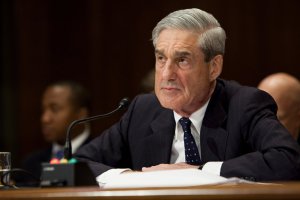A foreign-government-owned company that appears to be locked in a subpoena fight with Special Counsel Robert Mueller is taking the battle to the Supreme Court. Mystery firm takes Mueller-linked subpoena fight to Supreme Court:
 The identity of the firm and the foreign country at issue remain closely guarded secrets, but POLITICO first reported earlier this year that the dispute appeared to involve Mueller’s prosecutors.
The identity of the firm and the foreign country at issue remain closely guarded secrets, but POLITICO first reported earlier this year that the dispute appeared to involve Mueller’s prosecutors.
When the case was argued at the D.C. Circuit last week, the courtroom was closed to the public. Court personnel went to unusual lengths to preserve the secrecy, ordering journalists to leave the floor where lawyers were presenting their positions.
The public docket in the appeal offers only bare-bones information about the dispute, containing no identification of the parties or their lawyers. However, on Tuesday, the panel considering the appeal filed a three-page order revealing that the witness fighting the subpoena is a corporation owned by a foreign state.
The three-judge D.C. Circuit panel rejected the firm’s argument that its status as an extension of a foreign government makes it immune from grand jury subpoenas. The judges also said they were not persuaded by the firm’s claims that complying with the subpoena would be violating the law in the company’s home country.
After the order was filed Tuesday, sealed filings continued in the appeals court in what appeared to be a bid to stay the D.C. Circuit’s ruling or appeal it further. On Friday, the appeals court denied a motion from the company. The precise nature of the motion was not disclosed.
The foreign-government-owned company filed an application Saturday to Chief Justice John Roberts asking for a stay of the federal appeals court ruling turning down the company’s effort to block the grand jury subpoena for records.
Amy Howe at SCOTUSblog follows up, Justices asked to intervene in grand jury dispute:
[Saturday] afternoon the Supreme Court was asked to step into a clash over a grand jury subpoena that is widely believed to be related to Special Counsel Robert Mueller’s investigation into interference in the 2016 election. In a filing made under seal, an unnamed corporation – owned by a foreign country identified in the lower court only as “Country A” – apparently asked the justices to block the subpoena after the lower courts refused to do so. The case had been kept under wraps when the U.S. Court of Appeals for the District of Columbia Circuit heard oral argument last week, with courthouse security officers not only closing the hearing to the public but also locking down an entire floor of the courthouse.
* * *
[The] filing was under seal, so there is no way to know exactly what arguments are being made. However, the D.C. Circuit also rejected the corporation’s contention that the district court lacked power to hear criminal cases, such as this one, against foreign countries and the corporations that they own. In so doing, the court of appeals acknowledged that the Supreme Court’s earlier statements had not provided any “clear answer in this case” – which could also be the basis for the corporation’s plea.
[The] filing went to Chief Justice John Roberts, who handles emergency appeals from the District of Columbia and can either act on the request himself or refer it to the full court. The next step will likely be to call for a response from the federal government, although that too will almost certainly be under seal.
UPDATE: On Sunday evening, Chief Justice John Roberts temporarily blocked the district court’s order requiring the foreign corporation to comply with the grand jury subpoena or pay penalties. In a brief order, the chief justice directed the government to respond by noon on December 31 and indicated that the district court’s order would remain on hold until the government’s response is filed and either he or the full court takes additional action.
The Supreme Court has a conference scheduled on Friday, January 4. They will likely hold a vote to decide whether to hear this appeal then, or Chief Justice Roberts could issue additional orders on his own. Stay tuned.
At Law.com, Tony Mauro observes that if the case reaches the Supreme Court on the merits, past history suggests that the justices are not likely to “clear their court chamber like the D.C. Circuit did, and leave the public and press outside, scratching their heads.” (h/t SCOTUSblog).
Discover more from Blog for Arizona
Subscribe to get the latest posts sent to your email.
